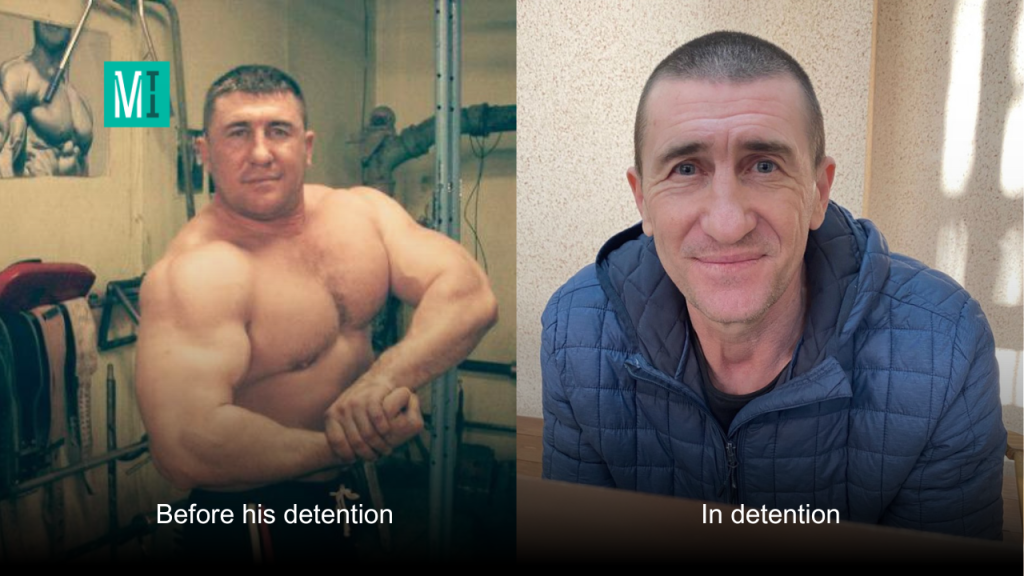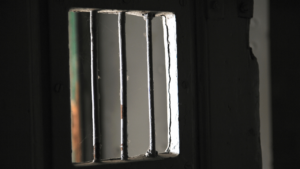“15 years of imprisonment for him is a death sentence.” Where the Russians are holding and why they are prosecuting Serhiy Kotov, a driving instructor from Oleshky

Oleshky is a city on the left bank of Kherson region, which has been under occupation since the beginning of Russia’s full-scale invasion. Just like they did in other occupied populated centers in Ukraine, the Russians immediately began kidnapping locals, torturing them, and illegally detaining them. One of those abducted from his home was driving instructor Serhiy Kotov. The Russians have held him in captivity for over two years, and recently ‘sentenced’ him to 15 years of imprisonment allegedly for espionage.
He got tazed and taken to mock executions
Armed Russians stormed into the Kotov family’s home on April 7, 2022. They separated Serhiy, his wife, and his underage daughter into different rooms, searched the house, and interrogated the man. Kotov was taken to an undisclosed site. For over a year, Serhiy’s family had no contact with him and learned about his whereabouts and condition from released prisoners.

Russian military detained Serhiy Kotov on April 7, 2022, in Oleshky, located on the left bank of Kherson region
It was only later that his daughter Viktoria learned that after his abduction, he was illegally detained in the SBU building in Kherson seized by the Russians. When Kotov was brought there, a familiar voice said: “Hello, Sergey!” But he doesn’t know who it was, as he was blindfolded. In the SBU building, he saw that the Russians were torturing a civilian over a video about how to evacuate from Oleshky, which had appeared online. The young man was beaten, had a bag put over his head, and the air was let out of it. When Kotov tried to intervene, the occupiers began to mock him too.
“They tazed him, beat him on the head, on the ribs. The eldest among the invaders said: ‘That’s it, take him to be shot’,” Viktoria retells her father’s words. When they supposedly took the man to be executed, a familiar voice asked: “So, Kot, do you remember now?” Viktoria notes that only close friends call her father that.
“In Kherson, my father was taken to an execution site and shots were fired over his ear, eventually he had a pancreatitis attack. Dad started vomiting and asked for a doctor. They dragged him to the courtyard, gave him water, and their doctor came out. They dragged my father into the building and put him on a drip. The following day they took him for interrogation again.
Serhiy Kotov is getting detained. Video from a Russian Telegram channel
This went on for three days, and on April 10, Serhiy Kotov was taken to Pretrial Detention Center No. 1 in the city of Simferopol, Crimea. In October 2022, many civilian detainees were transferred to Pretrial Detention Center No. 2 in the same city.
He lost 20 kg and resembled a skeleton
In Simferopol, Serhiy was kept in four-person cells with other civilians. Into his cell, they often threw those who had not passed the filtration check at the border of Kherson region and Crimea and, in the opinion of the occupiers, needed to be subjected to further interrogations and background checks. Those who ended up there had their phones scanned, fingerprints taken, and were subjected to a lie detector test. In the pretrial detention facility, Kotov’s health significantly deteriorated. The terrible food and lack of stable treatment for pancreatitis took their toll.
“He is vomiting and can’t eat anything. He lost 20 kg. We were in total shock, as my father used to be very active in sports. He weighed 90 kg, and now we see a mere skeleton,” Viktoria recounts.

The treatment of prisoners in the pretrial detention center depended on the guards and their mood. Some staff members tazed people. Walks sometimes lasted five, sometimes thirty minutes. Some hostages went on walks in summer clothes and shoes in cold weather because they had nothing else. There is 24-hour video surveillance in the cells. During the day, the guards forbade even sitting on the bed, forcing them to sing the Russian anthem.
Until May 2023, Serhiy Kotov had been incommunicado for a year and a month, with his family receiving no information about him. Then, he was ‘tried’ allegedly for espionage. Serhiy recorded an audio message in which he explained that he had undergone surgery on his leg, has osteomyelitis (a bone disease), and therefore moves on crutches, needing to take medication regularly. He also has hepatitis C, hernias, and chronic pancreatitis. In his message, Kotov called on the Ukrainian government to facilitate his release as soon as possible.
In September, the ‘verdict’ was announced: 15 years of imprisonment.
“With my father’s illnesses, this is a death sentence,” his daughter emphasizes.
She recounts that during the so-called trial, she encountered a fraudulent lawyer. Oleksiy Sazonov, originally from Kharkiv but living in Simferopol, holds both Ukrainian and Russian citizenships. According to the agreement with Viktoria, he was supposed to defend her father at all hearings. Instead, the lawyer showed no interest in the health or detention conditions of his client, visiting Serhiy only when called. Later, Sazonov made a new agreement with Kotov, which did not oblige him to defend the client if the ‘hearings’ involved state secrets. Viktoria notes: the lawyer terminated the agreement with her without her knowledge. For his services, Sazonov had already received $5,000.

Serhiy Kotov (on the left) behind bars
On February 13, 2024, the so-called ‘appellate court’ hearing took place, where the verdict against Serhiy was upheld. Currently, the family has filed a cassation complaint against this ‘ruling.’ Serhiy’s relatives do not know the names of the judges and prosecutors, nor the details of the hearing because the Russians have classified everything. It is only known that the man does not admit his guilt.
Illegal transfer to the Russian Federation: Where is Serhiy Kotov now?
In April, Serhiy Kotov was illegally transferred to Russia. In a month and a half, he was taken to Krasnodar, the village of Dvobratskoye in Krasnodar Kray, Volgograd, and Ulyanovsk. Throughout the one and a half months, he was fed only with dry rations.
“It was very cold in Ulyanovsk, they slept in two pairs of pants, a jacket; my father got very sick, they started giving him tuberculosis pills,” Viktoria explains.
During the transfer, relatives could send Serhiy parcels with clothes, personal hygiene items, and food. Currently, Kotov is in a quarantine cell in correctional colony No. 23 in the village of Kamyanskoye, Saratov region. Along with nine other civilian and military Ukrainians, Serhiy is waiting to be transferred to a barrack to serve his illegal sentence. According to Viktoria, her father will likely be kept with people who also have disabilities. She is now appealing to the International Committee of the Red Cross to officially confirm that Russia is detaining Serhiy Kotov.
This article was prepared with the support of the Ministry of Foreign Affairs of the Netherlands.
Maryna Kulinich, journalist at MIHR






